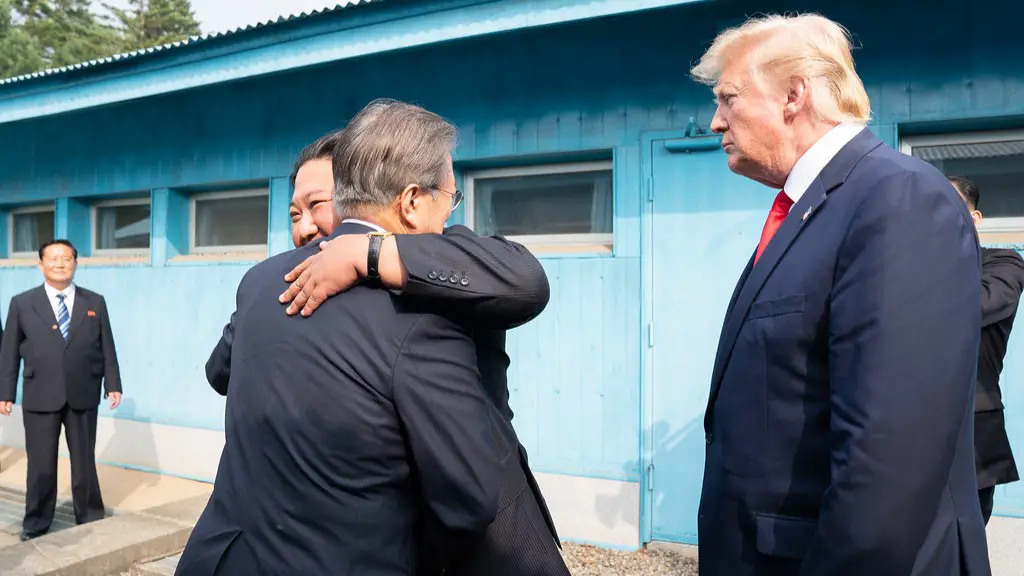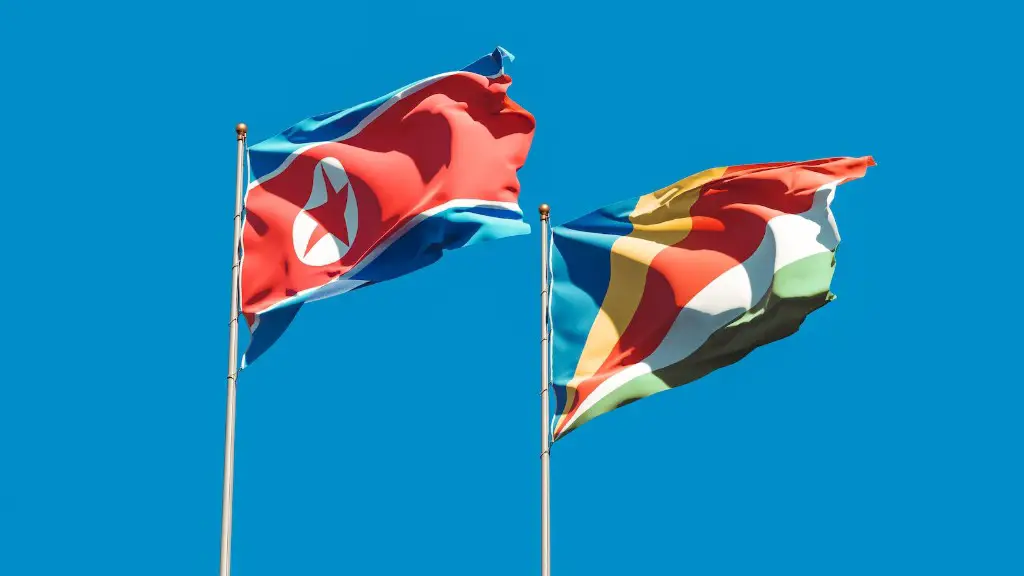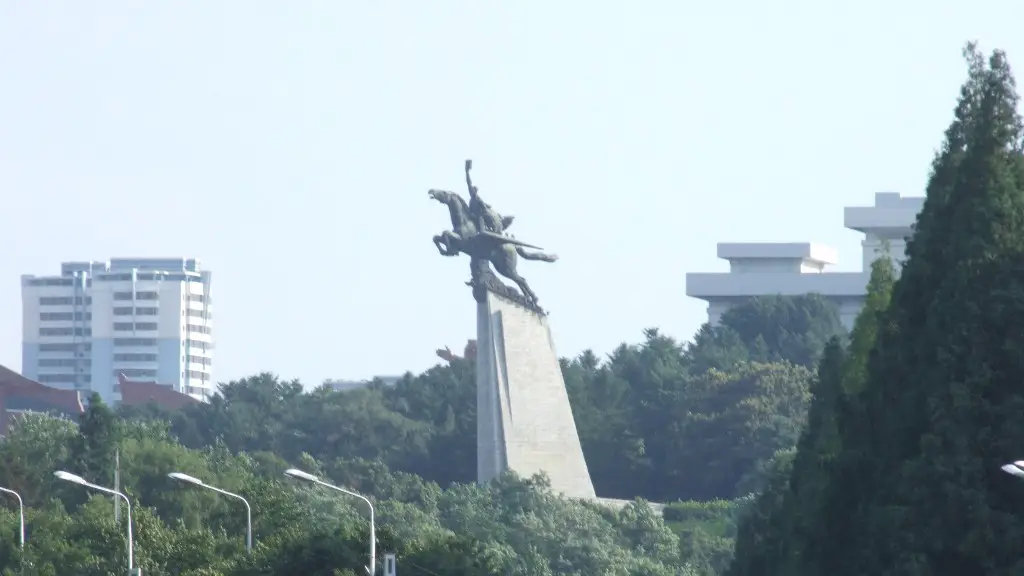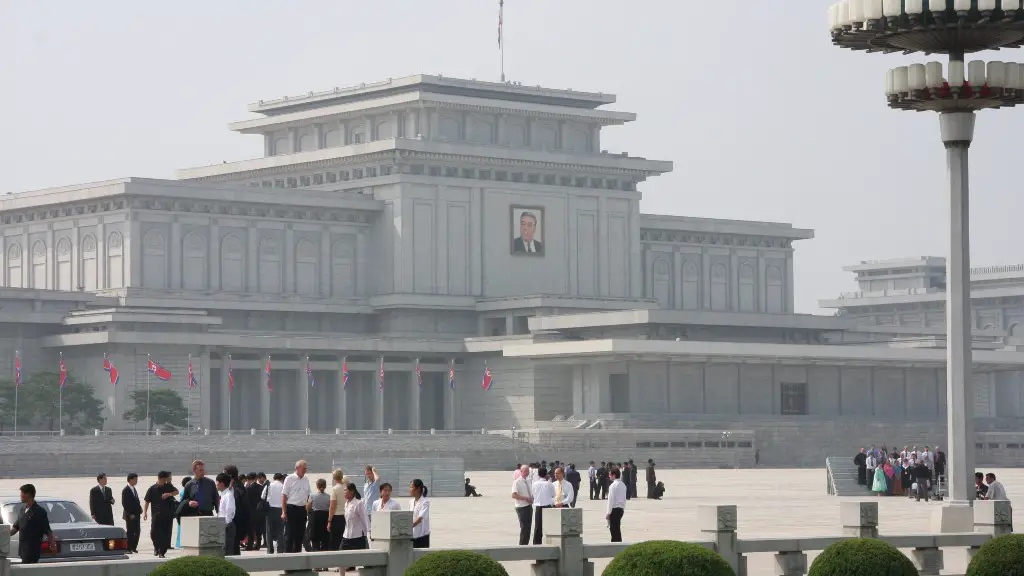Dennis Rodman, a former American professional basketball player and Chicago Bulls player, has been reported to visit North Korea several times in the past few years. His visits have raised eyebrows in the United States and around the world. Why would he visit a country that is labeled as a rogue state by the U.S. government?
To answer this question, it is important to understand the history between the United States and North Korea. North Korea is a Communist country whose leader, Kim Jong Un, has been engaged in a power struggle with the United States for years. This has resulted in a series of sanctions and threats from both sides. As a result, few Americans have visited the country, and even fewer have become friends with state leaders.
Rodman’s visits to North Korea began in February 2013, when he traveled with a team of basketball players for a documentary about the country. According to Rodman, he was invited by Kim Jong Un, and he accepted the invitation because he wanted to learn more about the culture and people of North Korea. He also hoped to improve the relationship between the two nations. During his first visit, he met with Kim Jong Un and they discussed basketball, among other things. Since then, Rodman has made at least four more trips to North Korea.
Rodman’s visits have been discussed by political analysts, who have offered various explanations. It is believed that Rodman’s visits may have helped create a platform for dialogue between the two countries, and that his celebrity status may have made it easier for North Korea to open up to the outside world. According to some analysts, Rodman has used his trips as a “diplomatic bridge” in order to open up North Korea to the United States. They argue that his visits may have contributed to de-escalating the tensions between the two countries.
However, not everyone agrees with this assessment. A number of analysts have argued that Rodman’s visits have not had any meaningful impact on U.S.-North Korea relations, and that his visits are simply a publicity stunt. They argue that Rodman’s visits have done nothing to improve the lives of the North Korean people or provide any tangible benefits to the U.S.
Rodman’s visits have certainly sparked debate about the United States’ relationship with North Korea. It remains to be seen whether his visits have truly made a difference in the relationship between the two countries.
North Korea’s Human Rights Violations
Even as Dennis Rodman has focused on bridging the gap between the United States and North Korea, there is no denying the fact that North Korea continues to violate human rights in a multitude of ways. According to Human Rights Watch, North Korea has an extensive and inhumane record of violations against its citizens, who are denied freedom of expression, association, peaceful assembly, movement, and access to information.
Those who are found guilty of dissident behavior, including political or religious dissent, are routinely punished by long prison terms in labor camps and other forms of censorship and detention, such as forced labor. In addition, North Korea is known to target, enslave, and abuse particular groups of people, mainly those of Korean origin like refugees, asylum-seekers, and migrant workers, and those coming from abroad. Women are also subject to forms of discrimination and violence.
Despite the fact that human rights are enshrined in the North Korean Constitution and that the government has made some progress in the past few years, meaningful change remains to be seen. The UN recently found that, despite efforts to tackle poverty, forced labor, and inadequate healthcare, the overall human rights situation has only worsened during Kim Jong Un’s rule.
The U.S. has continued to express its worries about North Korea’s ongoing and systematic human rights violations. While it is important to establish diplomatic relations with the country, it is equally important to ensure that human rights are respected, and that those guilty of violations are brought to justice.
Dennis Rodman and Diplomacy
While some have argued that Dennis Rodman’s visits to North Korea have been beneficial, it is hard to separate the sports figure from his personal motivations. His friendship with North Korean leader Kim Jong Un, as well as his close ties with the local basketball team, The Pyongyang Dragons, is seen as a questionable diplomacy tactic, rather than a reliable platform for communication and constructive dialogue.
Hence, while it is tempting to attribute Rodman’s visits as a successful diplomatic mission, it is hard to quantify the impact of his trips. Despite the positive words spoken of Rodman during his visits, it is difficult to tell if his presence will have any lasting effect on U.S.-North Korea relations or bring about any concrete changes to the lives of North Koreans.
What is clear, however, is that diplomacy between two states requires tact and compromise. While Dennis Rodman has taken it upon himself to become a sporting diplomat for U.S.-North Korea relations, it is important for the two states to explore other credible means of communication. Dialogue between the two powers should remain an importance crucial component of diplomatic success.
Sanctions and North Korea
The United States has placed a number of sanctions on North Korea since the Korean War, in an effort to pressure Kim Jong Un and the North Korean government to cease its nuclear weapons programs. These sanctions have targeted North Korean exports and imports as well as some of its key industries, such as coal and textiles.
The goal of these sanctions is to deter North Korea from continuing its nuclear program, as well as to limit its access to other technologies, resources, and funds necessary to support its military power. The hope is that these economic restrictions will force North Korea to return to the negotiating table and agree to true denuclearization.
The United States has also implemented a comprehensive sanctions regime in an effort to cut off North Korea’s access to the international financial system. The current sanctions prohibit North Korea from accessing the international banking system, as well as goods and services that are essential for its economy, such as oil and gas. These sanctions also restrict foreign direct investment in North Korea and limit remittances.
While these sanctions have been effective to some degree, they have come at a cost. By restricting access to goods and services, the sanctions have resulted in widespread poverty, food insecurity, and a general decline in the quality of life of North Koreans. It is imperative that the sanctions be lifted in a way that does not embolden the North Korean government, and that further economic aid be provided.
North Korea’s Stifling Media Environment
One of the key aspects of Kim Jong Un’s rule has been his stranglehold on the media, which has severely limited the freedom of expression of North Koreans. The state-controlled media is used to disseminate the North Korean government’s official stance on a range of topics, including the United States and the nuclear weapons program. North Koreans rarely get to hear different perspectives or even what is happening in the rest of the world.
Internet access is limited, with the government imposing a number of restrictions. Only state-designated information is available and heavily monitored by the government. While there has been an increase in the number of people with access to the internet, there remain significant barriers to accessing a reliable and uncensored source of information.
Moreover, North Koreans have limited access to foreign media, with the state broadcasting exclusively in Korean. In recent years, the government has cracked down on those suspected of watching foreign media, locking them up for long periods of time or subjecting them to execution.
The lack of information and media available to North Koreans has created an atmosphere of fear and uncertainty, with many afraid to speak out against the government or share their views. This has further entrenched the government’s power and stifled any possibility of a positive change in the country.
North Korea’s Tangible Benefits
While it is important to ensure that human rights violations in North Korea are adequately addressed, it is also essential to recognize the tangible benefits that the country has seen in recent years. Notably, the government has rolled out a range of economic reforms, resulting in higher wages, greater access to health care and education, and improved infrastructure.
Further, the World Bank has found that North Korea’s economy has grown at an impressive rate of 3.2%, making it one of the fastest growing economies in East Asia. This has been largely driven by economic reform, including revisions to the agricultural system, as well as a number of investment initiatives in infrastructure and other industries.
It is not only the economy that is seeing positive changes. North Korea is also set to host the 2018 Winter Olympics, an indication that the country may be slowly opening its doors to international collaboration and investment.
Thus, while it is important to remain vigilant and critical of North Korea’s human rights record, it is also essential to recognize the tangible benefits that the country has seen in recent years. This can be seen as evidence of the potential progress that North Korea can make if the right conditions are put in place.
Combining Sports and Diplomacy
In view of the current geopolitical climate, Dennis Rodman’s attempts to combine sports and diplomacy cannot be ignored. He has consistently argued that his trips are meant to improve U.S.-North Korea relations, bridge the gap between the two countries, and create a platform for dialogue.
Rodman has always maintained that his visits are about “basketball diplomacy.” He has explained that by talking about basketball and playing some games, he hopes to build bridges and foster understanding between the two countries. He also hopes that his presence will encourage North Korean citizens to learn more about the United States and its values.
Moreover, Rodman has also highlighted the significance of people-to-people dialogue. He believes that by engaging with people on a personal level, rather than through politics or sanctions, it is possible to establish connections and foster positive change. This is something that the U.S. and North Korea should strive for, as it can be a powerful tool in peace negotiations.
While it is unclear whether Dennis Rodman has achieved any tangible diplomatic success with his trips to North Korea, his efforts are certainly worthy of recognition. His visits have raised awareness about the country’s human rights abuses, increased understanding between the two nations, and encouraged dialogue from both sides. Thus, it is essential that his efforts in sports diplomacy are closely monitored and supported.





